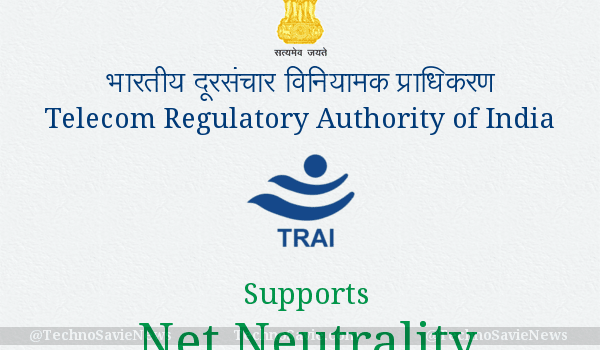
Indian Telecom Regulator releases recommendations to support Net Neutrality. This is the major step in favor of Net Neutrality in India while FCC (Federal Communications Commission of USA) is trying to kill it . Although, these recommendations will only effective when Telecom Ministry will pass these.
What is Net Neutrality?
Net Neutrality is the principle which says,
“ISPs (Internet Service Provider) must treat all data on the Internet the same, and not discriminate or charge differently by user, content, website, platform, application, type of attached equipment, or method of communication.”
Like cellular customers are paying different amount for calling/SMS based on different plans, but for same cellular network; if there is no Net Neutrality, customers will have to pay different amount for using different websites! For detailed explanation, check out below image:

Read More TRAI launches MyCall app for rating call quality and updates DND & MySpeed app
TRAI’s Recommendations
General
- The licensing terms should be amplified to provide explicit restrictions on any sort of discrimination in Internet access based on the content.
- Content would include all content, applications, services and any other data, including its end-point information, that can be accessed or transmitted over the Internet.
- Discriminatory Treatment:
- In the context of treatment of content would include any form of discrimination, restriction or interference in the treatment of content.
- Also includes practices like blocking, degrading, slowing down or granting preferential speeds or treatment to any content.
- The service providers should be restricted from entering into any arrangement, agreement or contract that has the effect of discriminatory treatment based on content, sender or receiver, protocols or user equipment.
- The scope of the proposed principles on non-discriminatory treatment apply specifically to “Internet Access Services”, which are generally available to the public.
- In order to remove any ambiguity, Internet Access Services have been defined.
Specialised Services shall be exempted from the principles of Discriminatory Treatment
- Services other than Internet Access Services, which are optimised for specific content, protocols or user equipment.
- Services where the optimisation is necessary in order to meet specific quality of service.
- DoT may identify specialised services.
- Specialised Services may be offered by the service provider only if they are not usable (or offered) as a replacement for Internet Access Services.
- Services which are detrimental to the availability and overall quality of Internet Access Services.
Internet of Things (IoT)
- As a class of services, are not excluded from the scope of the restrictions on non-discriminatory treatment.
- Critical IoT services, which may be identified by DoT, and which satisfy the definition of specialised services, would be automatically excluded.
Content Delivery Networks (CDNs)
- CDNs which enable a Telecom Service Provider (TSP) to deliver content within its network without going through the public Internet.
- Such TSPs are exempted from the scope of any restrictions on non-discriminatory treatment.
Traffic Management
- Internet Access Service Providers may take reasonable measurements for traffic management, provided the same are proportionate, transient, and transparent.
- ISPs may also take reasonable measures to preserve integrity and security of network, for provision of Emergency Services, implementation of an order of the court or direction of the Government, or in pursuance of an international treaty.
- TSPs shall declare their Traffic Management Practices (TMP) and their impact it may have had on the users.
- Disclosure requirements shall also include information about specialised services, direct or indirect arrangements.
A Body to monitor & investigate violations have representatives from
- Telecom Service Providers
- Internet Service Providers
- Content Providers
- Representatives from Research & Academia
- Civil Society Organisations
- Consumer Representatives
Net Neutrality History in India
Back in June 2013, Airtel starts offering some Google services to its cellular broadband users which is against the Net Neutrality. In December 2014, Airtel changed its service terms for 2G and 3G data packs so that VoIP data was excluded from the set amount of free data. Though, Airtel isn’t violating Net Neutrality because at that time there is no law present for it.






